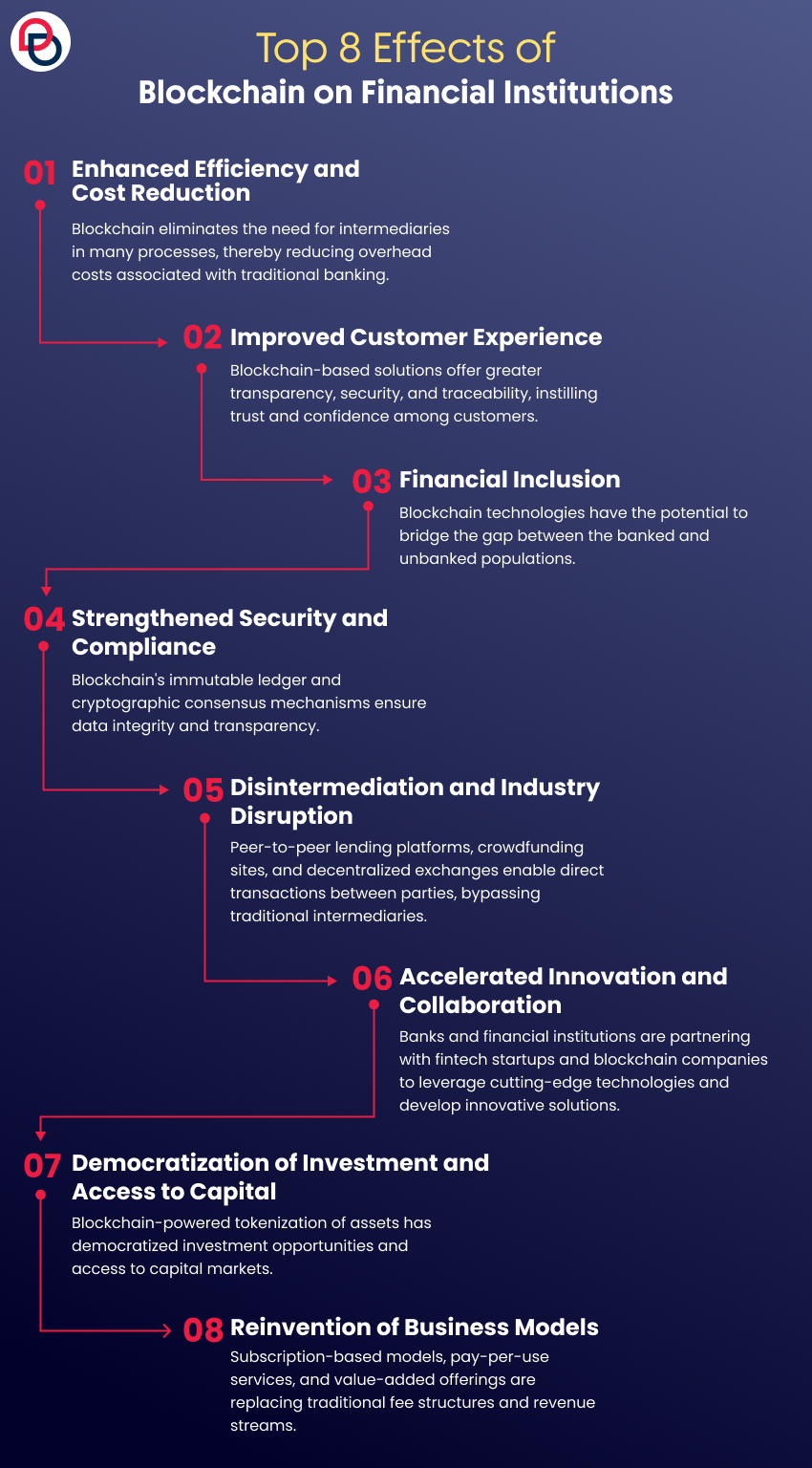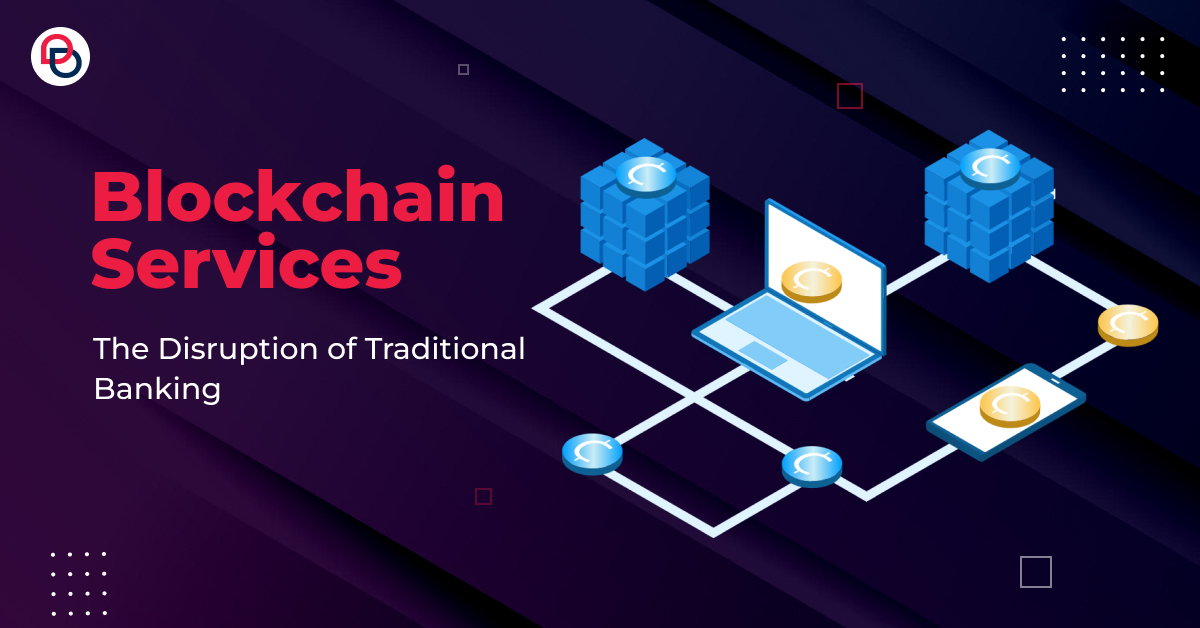Blockchain Services: The Disruption of Traditional Banking
In today’s technology landscape, few innovations have captivated as much promise and attention as blockchain. Initially known as the underlying technology behind cryptocurrencies like Bitcoin, blockchain has since transcended its origins to revolutionize various industries, with banking and financial services being at the forefront of this disruption.
Here, we will delve into how blockchain services are reshaping traditional banking and financial services, exploring the transformative power of blockchain technology and its myriad applications.
Understanding Blockchain Services
Blockchain, in its simplest form, is a decentralized ledger that records transactions across a network of computers. Each “block,” is securely linked to the former one, which forms a chain. What sets blockchain apart is its distributed nature and cryptographic security, which ensure transparency, immutability, and trust among participants without the need for intermediaries like banks or clearinghouses.
Blockchain services encompass a broad range of offerings aimed at leveraging blockchain technology to streamline processes, enhance security, and drive innovation across industries. These services include blockchain development services, blockchain technology services, and others. Whether it’s developing custom blockchain solutions, integrating existing systems with blockchain technology, or providing consultancy and support, blockchain service providers play a pivotal role in driving adoption and unlocking the full potential of this disruptive technology.
Disrupting Traditional Banking
Traditional banking and financial services have long been characterized by centralized control, lengthy processes, high costs, and inherent inefficiencies. However, the emergence of blockchain services is challenging this status quo by offering a decentralized, transparent, and efficient alternative.
One of the most significant impacts of blockchain on traditional banking is in the realm of payments and remittances. Blockchain-powered platforms enable near-instantaneous cross-border transactions at a fraction of the cost compared to traditional methods. Companies specializing in blockchain development services are creating innovative payment solutions that eliminate intermediaries, reduce settlement times, and provide greater financial inclusion, especially for the unbanked and underbanked populations.
Furthermore, blockchain technology services are facilitating the digitization of assets through tokenization, allowing for the seamless transfer and exchange of various assets, including securities, real estate, and commodities. This not only enhances liquidity but also introduces new investment opportunities and democratizes access to financial markets.
Enhancing Security and Transparency
One of the core principles of blockchain technology is its emphasis on security and transparency. By employing cryptographic techniques and decentralized consensus mechanisms, blockchain services offer unparalleled security, mitigating risks such as fraud, data tampering, and unauthorized access.
Blockchain’s transparent nature also addresses concerns related to trust and accountability in traditional banking. Every transaction recorded on the blockchain is immutable and verifiable, providing a complete audit trail of financial activities. This transparency not only fosters trust among stakeholders but also enhances regulatory compliance, as regulators can access real-time, tamper-proof data for oversight and enforcement purposes.
Harnessing Innovation and Efficiency
In addition to disrupting existing paradigms, blockchain services are driving innovation and efficiency in various aspects of banking and financial services. Smart contracts, self-executing contracts with the terms of the agreement directly written into code, automate processes and enforce contractual obligations without the need for intermediaries. Companies offering blockchain application development services are leveraging smart contracts to streamline processes such as trade finance, insurance claims processing, and supply chain management, reducing costs and minimizing errors.
Moreover, blockchain technology services are facilitating the emergence of decentralized finance (DeFi), a rapidly growing sector that seeks to recreate traditional financial services, such as lending, borrowing, and trading, on blockchain networks. DeFi platforms leverage smart contracts and decentralized protocols to offer financial services without relying on traditional banks or intermediaries. This not only fosters financial inclusion by providing access to financial services for individuals and businesses worldwide but also introduces novel concepts like yield farming, liquidity mining, and decentralized exchanges.
Top 8 Effects of Blockchain on Financial Institutions

Financial technology (FinTech) and blockchain have emerged as transformative forces reshaping the landscape of financial institutions. From traditional banks to investment firms, these technologies are disrupting established practices and revolutionizing the way financial services are delivered.
Let’s explore eight key effects of fintech and blockchain on financial institutions.
1. Enhanced Efficiency and Cost Reduction
One of the most significant impacts of fintech and blockchain on financial institutions is the enhancement of efficiency and the reduction of operational costs. Automation of processes, such as account management, loan processing, and compliance, streamlines operations, reduces manual errors and accelerates transaction speeds. Blockchain, in particular, eliminates the need for intermediaries in many processes, thereby reducing overhead costs associated with traditional banking.
2. Improved Customer Experience
Fintech innovations have revolutionized the way customers interact with financial institutions. Mobile banking apps, digital wallets, and robo-advisors provide convenient, user-friendly interfaces for managing finances and making transactions. Blockchain-based solutions offer greater transparency, security, and traceability, instilling trust and confidence among customers. Moreover, personalized services and real-time insights powered by data analytics enhance the overall customer experience, fostering loyalty and satisfaction.
3. Financial Inclusion
Fintech and blockchain technologies have the potential to bridge the gap between the banked and unbanked populations by providing access to financial services for underserved communities. Mobile payment solutions, peer-to-peer lending platforms, and digital identity systems enable individuals without traditional banking access to participate in the formal financial system. Blockchain-based decentralized finance (DeFi) platforms offer alternative banking services, such as lending, borrowing, and investing, without the need for intermediaries, thus promoting financial inclusion on a global scale.
4. Strengthened Security and Compliance
Cybersecurity and regulatory compliance are paramount concerns for financial institutions in the digital age. Fintech innovations leverage advanced encryption techniques, biometric authentication, and AI-powered fraud detection systems to fortify security measures and protect against cyber threats. Blockchain’s immutable ledger and cryptographic consensus mechanisms ensure data integrity and transparency, facilitating compliance with stringent regulatory requirements, such as Know Your Customer (KYC) and Anti-Money Laundering (AML) regulations.
5. Disintermediation and Industry Disruption
Fintech and blockchain technologies are challenging the traditional intermediary role of banks and financial institutions. Peer-to-peer lending platforms, crowdfunding sites, and decentralized exchanges enable direct transactions between parties, bypassing traditional intermediaries. Smart contracts on blockchain networks automate the execution of agreements, reducing reliance on third-party intermediaries for contract enforcement. This disintermediation threatens the relevance of traditional financial institutions and accelerates industry-wide disruption.
6. Accelerated Innovation and Collaboration
The rise of fintech and blockchain has spurred unprecedented levels of innovation and collaboration within the financial industry. Established banks and financial institutions are partnering with fintech startups and blockchain companies to leverage cutting-edge technologies and develop innovative solutions. Collaborative ecosystems, such as innovation labs, accelerators, and industry consortia, foster cross-sector collaboration and knowledge sharing, driving continuous innovation and digital transformation.
7. Democratization of Investment and Access to Capital
Blockchain-powered tokenization of assets has democratized investment opportunities and access to capital markets. Fractional ownership of assets, such as real estate, artwork, and commodities, allows retail investors to diversify their portfolios and participate in previously inaccessible markets. Initial Coin Offerings (ICOs) and Security Token Offerings (STOs) enable startups and small businesses to raise capital from a global pool of investors, bypassing traditional venture capital channels. This democratization of investment has the potential to democratize wealth and foster economic empowerment.
8. Reinvention of Business Models
Fintech and blockchain technologies are catalyzing the reinvention of traditional business models in the financial industry. Subscription-based models, pay-per-use services, and value-added offerings are replacing traditional fee structures and revenue streams. Platforms embracing open banking and API integration enable third-party developers to build innovative financial applications and services, fostering ecosystem growth and innovation. As financial institutions adapt to these new paradigms, agile business models and digital-first strategies become imperative for sustained competitiveness and relevance.
Also Read: Maximizing Potential: A Guide to Investing in Blockchain Services
Challenges and Future Outlook
Despite its immense potential, the widespread adoption of blockchain in traditional banking and financial services faces several challenges. Scalability, interoperability, regulatory uncertainty, and concerns regarding privacy and data protection are some of the key hurdles that need to be addressed. Moreover, legacy infrastructure, organizational inertia, and the vested interests of incumbents pose additional barriers to adoption.
However, the momentum behind blockchain services continues to grow, driven by increasing awareness, technological advancements, and shifting market dynamics. As blockchain technology matures and standards evolve, we can expect to see greater collaboration between traditional financial institutions and blockchain service providers, leading to hybrid solutions that combine the benefits of both worlds.
Wrapping Up
Blockchain services are reshaping traditional banking and financial services by offering decentralized, secure, and efficient alternatives to conventional systems. From payments and remittances to asset tokenization, blockchain technology is unleashing new opportunities and driving innovation across the financial landscape.
Additionally, blockchain services are exerting profound effects on financial institutions, driving unprecedented levels of innovation, efficiency, and disruption. From enhancing customer experiences to promoting financial inclusion, the transformative impact of these technologies continues to reshape the financial landscape. While challenges remain, the disruptive potential of blockchain services cannot be ignored, heralding a new era of transparency, inclusivity, and efficiency in finance.
So, harness the power of blockchain services to boost your financial operations.




